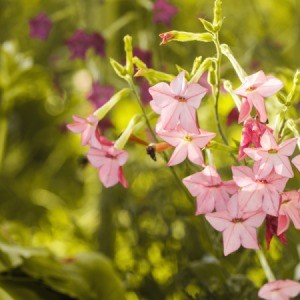 Nicotiana (ni-co-she-AA-nuh) is a genus of herbaceous plants and shrubs that belong to the Solanaceae family (nightshade). The plants are indigenous to the Americas, Australia, SW Africa, and the South Pacific.
Nicotiana (ni-co-she-AA-nuh) is a genus of herbaceous plants and shrubs that belong to the Solanaceae family (nightshade). The plants are indigenous to the Americas, Australia, SW Africa, and the South Pacific.
The various members of the Nicotiana species are commonly referred to as flowering tobacco plants and are grown in gardens for their attractive late afternoon blooms and for the amazing fragrance they emit in the evening.
Nicotiana is easy to grow. You can buy plants at your local nursery or big box store. It can also be fairly easy to propagate from seed. Sow the seeds on top of the soil, as they need light to germinate. They can be started outdoors in warm climates, but in more temperate, cooler ones you may want to start them indoors. The seeds need 2 - 3 weeks to geminate, so check your growing zone when choosing where to sow them. Nicotiana behaves as an annual in temperate climates. It grows well in full sun to part shade. They prefer moist soil with good drainage.
Blooms appear in early summer and continue all season, typically until frost in many areas. The 5 pointed, trumpet shaped flowers can be red, white, pink, rose, yellow, or lavender. There is even a lime green flowering variety. The sticky, hairy foliage can cause skin irritation via contact. Depending on the variety you choose, the plants can reach heights between 1 - 5 feet.
Generally speaking, nicotiana plants are basically problem free once established. Aphids and gnats can sometimes be problematic. If grown in moist shady areas slugs may feast on them. There is also the potential of foliage damage by flea beetles which leave tiny holes in the leaves. They can be deterred by using diatomaceous earth. The tobacco hookworm is likely the culprit if your plant looses quite a bit of foliage overnight. They can be hand picked or you can try applying bacillus thuringiensis, a bacteria that attacks the digestive system of garden pests and kills them. Keep in mind, however, that the hookworm is the larval stage of the hummingbird moth that you may wish to attract to your plants. Another of the many gardening paradoxes you may face.
One word of warning: these plants are poisonous if swallowed, so keep them away from children and pets.
Check out these photos.
This nicotiana plant is in its third year now, probably because we have had such mild winters recently. It is related to the tobacco plant which you can probably guess by its name. It is right by our back door and the scent it gives off in the evening when the flowers start to open is magnificent.